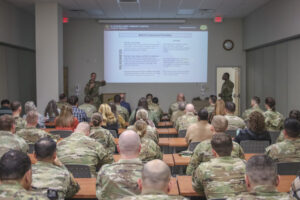Blanchfield Army Community Hospital command leadership recently provided a framework for department and section leaders to identify critical tasks to make the 2024-2028 BACH Health System Campaign Plan a reality.
BACH commander Col. Sam Preston and hospital deputies shared the organization’s mission and vision, where the hospital is going, how it will get there, and its purpose. “Our mission is clear. Without compromise, we are committed to healthcare excellence, delivering readiness for our Warfighters, Families, and Community.”
Preston reinforced that the two most important words of the Mission statement were “without compromise.” He emphasized that BACH personnel do not compromise their contribution to healthcare excellence or in delivering readiness to Fort Campbell’s Warfighters, Families, and the surrounding community. The hospital will continue to push training to the forefront without compromising the current standard of medical care.
The vision states, “Blanchfield is the gold standard military health system; transforming healthcare, readiness, and training because of our people, innovation, and service.”
The vision challenges civilian and military staff to be the gold standard, train, and be ready to evolve along with the needs of a transforming healthcare system. Hiring the right people, setting conditions for innovation, and creating training opportunities are the foundation for mission accomplishment.
“We have to take these concepts and turn them into actions we can measure over time,” says Preston.
Three priorities were identified, each supported by multiple lines of effort:
Priority 1: Our People
Priority 2: Safe, Quality, and Effective Healthcare
Priority 3: Developing the Future of Military Medicine
Preston relayed how BACH’s employees are its lifeblood. Every civilian and military member works tirelessly to serve their role within the hospital. Retaining staff in key positions provides a wealth of experience for others to draw upon and keeps workflows smooth.
Providing competitive compensation and benefits, regular feedback on performance, and flexible work arrangements are some of the critical components of ensuring BACH is an employer of choice in the area.
Recruiting new talent ensures high standards are upheld, enriches the hospital’s culture, and helps uphold BACH’s reputation. Plans are to encourage residents to place BACH as their choice for assignment, employment procedures are streamlined for civilians, and leaders are trained to identify relationships with the local community to establish lasting partnerships.
Providing education, training, certification, and credentialing opportunities develops existing staff skills to stay on the cutting edge of healthcare practices. Regular skill assessments and relevant training ensure the quality of healthcare delivered meets or exceeds Defense Health Agency and Army standards. Goals for recognition and staff rewards highlighting exceptional performers and those who work hard and provide selfless service for the Fort Campbell community continue and improved upon.
Safety, quality, and effective healthcare can only be provided through a culture of excellence. BACH emphasizes continuous improvement, open communication, collaboration, and shared responsibility for patient outcomes.
BACH leadership encourages partnerships with patients to promote wellness and preventive care. Additional resources and training reduce MHS GENESIS errors and improve patient outcomes. BACH staff monitors analytics looking for anomalies and identify issues before they become significant problems.
Several initiatives outline the need to establish a patient/family partnership council, increase patient education campaigns throughout the year, and expand telemedicine services to reach people wherever they live.
Collaboration internally and externally cultivates partnerships within teams and with other medical professionals in the community.
Both the Assistant Secretary of Defense for Health Affairs Dr. Lester Martinez-López and Defense Health Agency Director U.S. Army Lt. Gen. Telita Crosland pushed similar guidance in February during an annual meeting of AMSUS, The Society of Federal Health Professionals, in National Harbor, Maryland. Martinez spoke about the need to forge strong relationships.
Crosland echoed Martinez’s sentiment, “The need for close collaboration has never been greater. There has been great change over the past six or seven years–not just organizational change, but change driven by the pandemic, and larger changes in American medicine.”
The future of military medicine continues to provide a Medically Ready Force, a Trained Medical Force, and improve the health of all those entrusted to its care. The goal is to be proactive as much as possible. BACH accomplishes this by empowering the enlisted Career Management Field to perform at the top of their scope of practice. This enables skills to stay sharp, and if military personnel are pulled for real-world missions, they are prepared with the most up-to-date training and techniques.
Martinez shares in the Military Health System Strategy, a roadmap to guide the system into the next Future Years Defense Program, “Success will require all of us moving in the same direction with a shared commitment to those we serve. We remain focused on readiness and health care for all our beneficiaries. The two are inseparable: when our people take care of people, we increase the readiness of the Total Force.
Blanchfield is a crucial player in improving the health and readiness of the Warfighter and their families, and its team leverages every aspect to develop the future of the Military Health System through innovation and advancement. BACH multidisciplinary teams formalize, codify, and optimize enduring Virtual Health and Point of Care Ultrasound programs. This campaign plan benefits future patients, while guiding the health system through 2028.
“The BACH Campaign Plan models the Military Health System Strategy in helping guide us forward,” said Preston.
“Now the Blanchfield team has the Mission, Vision, Priorities, and strategies outlined, our leaders must translate them to the important tasks in order for the organization to continue evolve, meeting the medical needs of 2028. It is truly an honor to serve the healthcare needs of this great community.”
U.S. Army story by: Staff Sgt. John Howard
